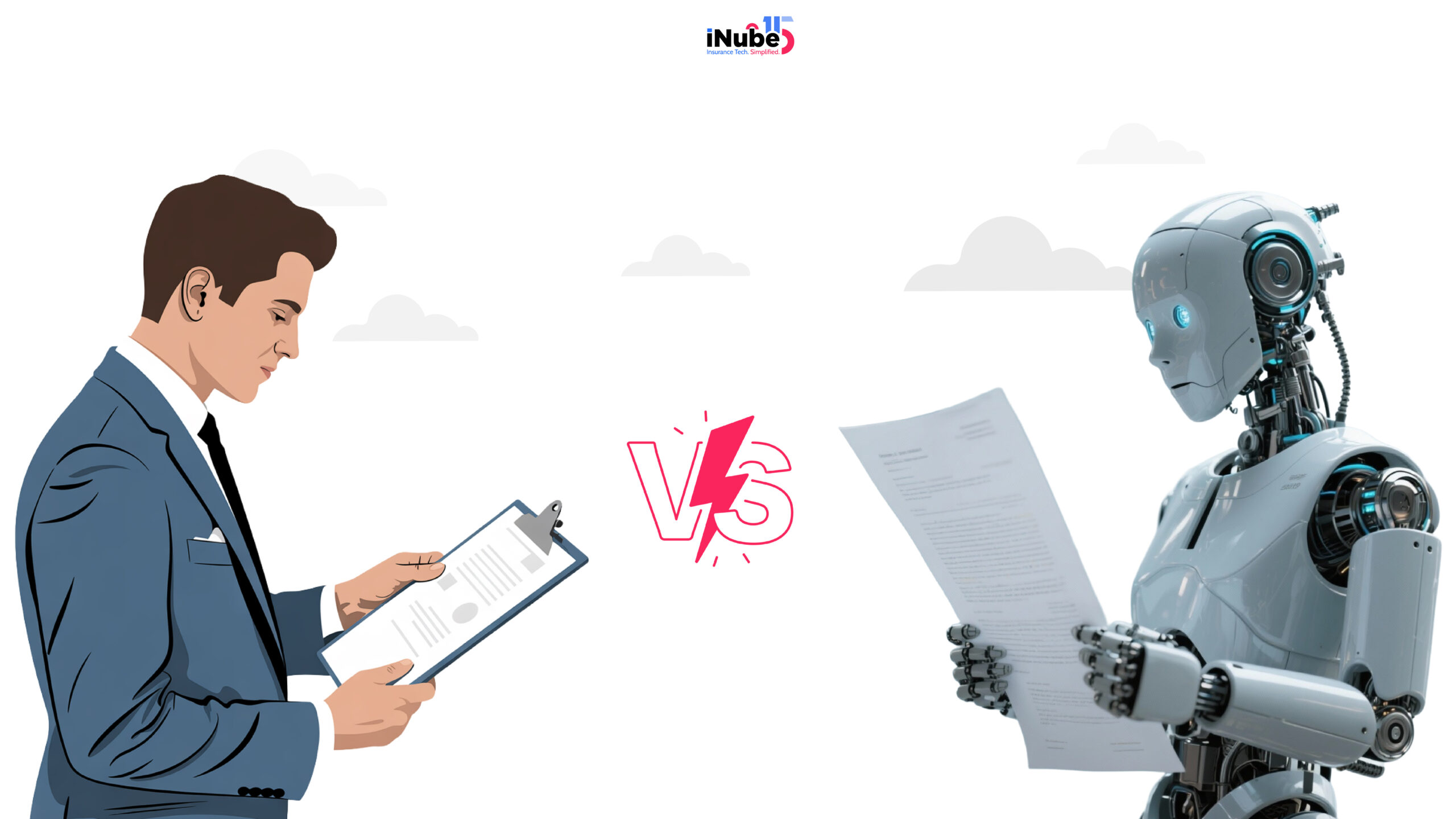For decades, the insurance industry has revolved around human trust, which includes the handshake of an agent; the familiar voice will essentially guide you through the complex policies. However, as the AI in insurance and the insurance technology advance at lightning speed, a fundamental question will be looming large, which is-
Are Algorithms set to replace insurance agents?
Additionally, the rise of AI insurance solutions will not be a distant future scenario, and it is unfolding right now. Right from automated underwriting to predictive claims processing and hyper-personalized policy recommendation, AI will be reshaping the way insurers operate. However, at the heart of this transformation lies a delicate balance: leveraging machine intelligence for boosting efficiency while also preserving the human touch that builds trust and loyalty.
AI’s Growing Role in Insurance and Automation
The role of AI in insurance is expanding exceedingly and is transforming the way underwriting occurs by including price, market, and service of their products. This is far from being a futuristic concept, and insurance automation is already driving a tangible result across the insurance value chain.
As per McKinsey, the AI technologies could seamlessly generate up to $1.1 trillion in annual value globally for the insurance sector by 2030. This is primarily through smarter risk assessments, automated claims handling, enhanced fraud detection, and hyper-personalized customer experiences. Additionally, the insurers are using AI models for analyzing a vast number of datasets, which include everything from telematics to behavioral signals, to make underwriting faster and also more precise. The chatbots and the virtual assistants are improving service accessibility and significantly reducing operational costs.
What are the Insurance Agents Doing Today and How AI is Performing Analogous Tasks?
For decades, insurance agents have been the trusted bridge between complex policies and everyday customers. Their role goes beyond just selling; they educate the customers on coverage options, assess the individual and the business risks, guide them through the maze of underwriting requirements, assist during the claims, and offer a human layer of trust in an industry that can often feel opaque.
Insurance agents are skilled at interpreting the fine print, customizing the solutions to unique situations, and, most importantly, building relationships that last over the policy lifespans.
This is where the AI in insurance will come into the picture. Many of the traditional human-led functions are finding their digital counterparts. The advanced underwriting models are essentially powered by AI and will now be ingesting massive volumes of data, right from telematics and wearables to third-party databases, assessing the risk more quickly and quite accurately than ever before. This was not the case initially, the insurance agent who once gathered manually.
The insurance technology will automate data collection and also use predictive analytics for generating quotes and tailoring the products in real-time.
Claims handling, which is another domain that was historically dependent upon the insurance agents, is essentially being reshaped through insurance automation. The AI systems will be seamlessly analyzing the claims submissions, detecting the anomalies, estimating the damage using image recognition, and even recommending the settlement amounts- this will drastically cut down the turnaround times.
Customer support, which was traditionally driven by phone calls and branch visits, has evolved into AI chatbots that are available all around the clock, along with virtual agents offering instant policy information, product comparisons, and FAQs. As per a recent study from McKinsey, the leading insurers who are using AI for claims and service functions have seen around a 20-30% reduction in the processing costs and also significant improvements in customer satisfaction.
Where will Human Agents Bring an Irreplaceable Value?
Even with the strong automation, there are many domains where the insurance agents remain crucial:
Trust, Relationships, and Advisory Roles
Most of the clients prefer human interaction when they make high-stakes decisions or when they need guidance through the regulatory, legal, and financial consequences.
Complex Risk Cases
For larger insurance businesses such as Life insurance with medical issues or the coverage that essentially requires judgmental/case-by-case tailoring, human empathy, negotiation, and domain expertise, it will be quite hard to replicate automatically.
Regulatory and Ethical Oversight
When decisions have fairness, privacy, or compliance implications, there will be human oversight that is required most often. Not only that, the AI models will have bias, a lack of transparency, and also failure in the edge cases.
Emotional Labour
By helping somebody through a claim, which essentially involves empathy or reassurance, they are still largely dependent upon human territory.
How are Agent Roles Evolving- The Future of Insurance Agents?
Instead of a complete disappearance, the future of insurance agents essentially looks like a transformation of their role:
Interpreting AI Insights for Personalized Recommendations
In the future, insurance agents will not just sell policies but also act as interpreters of AI-generated intelligence. With predictive analytics and machine learning models, there is an easy delivery of nuanced risk scores, behavioral patterns, and product matches in real-time. The insurance agents will be playing an important role in translating this information into personalized advice that resonates with the customer’s real-world needs.
Leveraging Technology to Enhance Productivity
The AI-powered dashboards, digital onboarding tools, virtual assistants, and CRM integrations will allow the insurance agents to handle larger portfolios with much greater efficiency. Additionally, the insurance agents who embrace these tools will not only improve their productivity but also deliver faster and more seamless experiences to the customers.
Becoming A Trusted Risk Partner in A Digital Ecosystem
As the insurance industry’s digital transformation accelerates, the distribution will increasingly happen through the omnichannel ecosystems that essentially involve banks, fintech, health apps, and mobility platforms. In this environment, the insurance agents will be evolving into more trusted risk partners, who will be working across different platforms to offer contextual coverage, advise on regulatory and ethical considerations, while also building long-term relationships with the digitally savvy customers.
This unique human touch will blend empathy, ethical judgement, and also nuanced understanding that will become even more valuable in differentiating the insurers, even in a crowded market.
While the evolution of insurance agents will help ease distribution, there are certain challenges and barriers that full automation will bring.
What are the Challenges and Barriers to Full Automation?
There are several reasons why algorithms will not replace human insurance agents. Here are a few challenges that full automation will bring:
Talent Gaps
Implementing AI essentially requires data scientists, AI and project managers, followed by insurance agents who are trained to interpret the AI insights.
Customer Trust and Acceptance
Not all the policyholders are comfortable interacting solely with the AI systems, especially for the high-stakes insurance decisions.
Integration with the Partner Ecosystems
Most insurers rely upon third-party data from fintech, health apps, and the mobility platforms that enhance personalization.
The Path Forward
While automation will drastically increase efficiency, its full potential will be constrained by data, regulatory, human, and ecosystem factors. The future of insurance lies in the hybrid models where AI essentially handles the repetitive tasks and analysis, while the human insurance agents essentially focus upon judgment, empathy, and strategic advisory.

Archismita Mukherjee
Insurance Content Analyst


